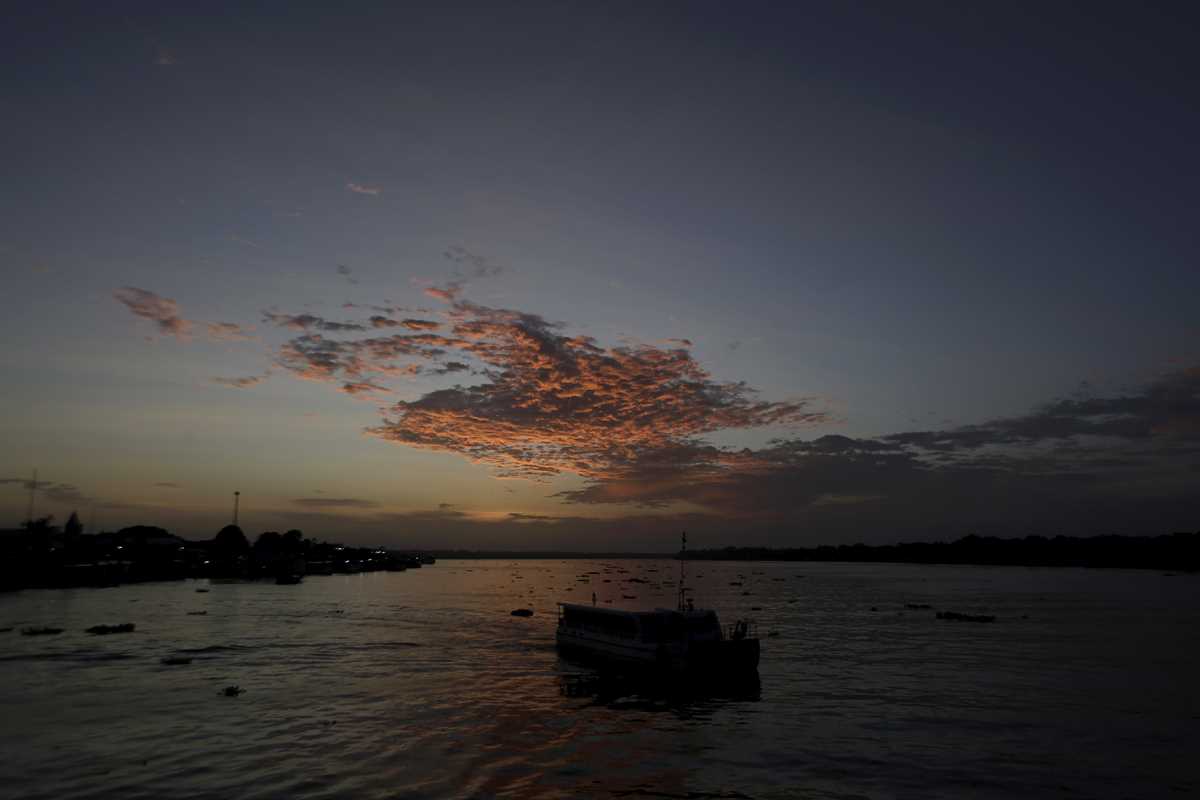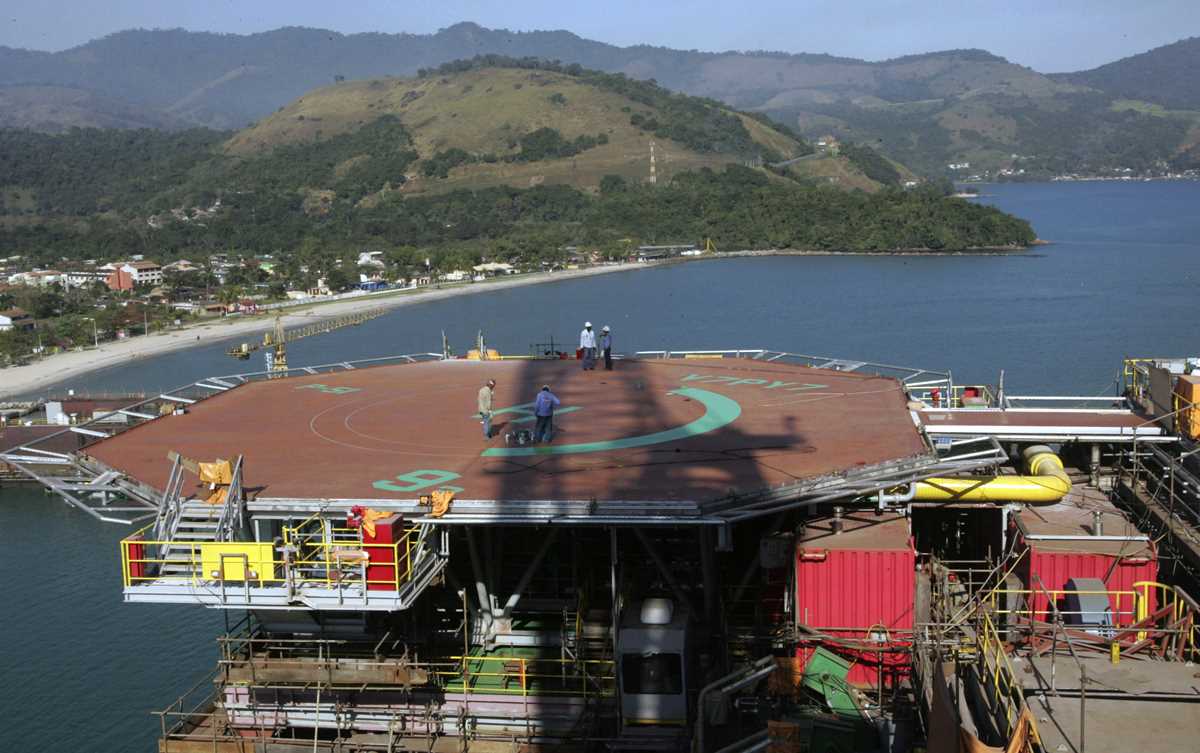 A passenger boat departs from the port city of Breves, located on the island of Marajo, Para state, on the mouth of the Amazon river, Brazil, Thursday, Dec. 3, 2020. Brazil’s environmental regulator refused on Wednesday, MAy 17, 2023, to grant a license for a controversial offshore oil drilling project near the mouth of the Amazon River, prompting celebration from environmentalists who had warned of its potential impact. (AP Photo/Eraldo Peres, File)
A passenger boat departs from the port city of Breves, located on the island of Marajo, Para state, on the mouth of the Amazon river, Brazil, Thursday, Dec. 3, 2020. Brazil’s environmental regulator refused on Wednesday, MAy 17, 2023, to grant a license for a controversial offshore oil drilling project near the mouth of the Amazon River, prompting celebration from environmentalists who had warned of its potential impact. (AP Photo/Eraldo Peres, File) Petrobras workers walk on platform 51 "Majuro" in Angra dos Reis, Brazil, Aug. 21, 2008. (AP Photo/Ricardo Moraes, File)
Petrobras workers walk on platform 51 "Majuro" in Angra dos Reis, Brazil, Aug. 21, 2008. (AP Photo/Ricardo Moraes, File)RIO DE JANEIRO (AP) — Brazil’s environmental regulator has rejected a license for a controversial offshore oil drilling project near the mouth of the Amazon River that had drawn strong opposition from activists who warned of its potential for damaging the area.
The agency’s president, Rodrigo Agostinho, highlighted environmental concerns in announcing the decision Wednesday evening to turn down the state-run oil company Petrobras' request to drill the FZA-M-59 block. He cited “a group of technical inconsistencies" in the company's application.
With Brazil's existing production set to peak in coming years, Petrobras has sought to secure more reserves off Brazil’s northern coast. The company earmarked almost half its five-year, $6 billion exploration budget for the area, and in a statement Thursday said it would file an official request that the decision be reconsidered.
CEO Jean Paul Prates had said that the first well would be temporary and that the company has never recorded a leak in offshore drilling. The company failed to convince the environmental agency.
“There is no doubt that Petrobras was offered every opportunity to remedy critical points of its project, but that it still presents worrisome inconsistencies for the safe operation in a new exploratory frontier with high socioenvironmental vulnerability,” Agostinho wrote in his decision.
The unique and biodiverse area is home to little-studied swaths of mangroves and a coral reef, and activists and experts had said the project risked leaks that could be carried widely by tides and imperil the sensitive environment.
Eighty civil society and environmental organizations, including WWF Brasil and Greenpeace, had called for the license to be rejected pending an in-depth study.
Caetano Scannavino, coordinator of Health and Happiness, an Amazon non-profit group that supports sustainable projects in the Tapajos basin, congratulated Agostinho on Twitter “for not succumbing to pressure, asking for more studies, and prioritizing science in the service of the collective.”
“It is a sensitive, little-studied region, and there’s no way back for any mistake there,” Scannavino added. “Not to mention the government’s promise of a decarbonized future.”
The Climate Observatory, a network of environmental non-profits, also cheered the decision, saying in a statement that “Agostinho is protecting a virtually unknown ecosystem and maintains the coherence of the Lula government, which has promised in its discourse to be guided by the fight against the climate crisis.”
During the first presidential terms of Luiz Inácio Lula da Silva, from 2003 to 2010, huge offshore discoveries became a means of financing health, education and welfare programs. Some members of his Workers' Party continue to see oil as a means to ensure social progress.
Energy Minister Alexandre Silveira said in March that the area is the “passport to the future” for development in Brazil’s northern region. In his prior terms, Lula used the same phrase to describe the offshore oil discoveries in an area known as pre-salt.
But Lula has strived to demonstrate the environmental awakening he has undergone in the years since, with protection of the Amazon a fixture in his campaign last year to unseat Jair Bolsonaro and return to the presidency.
Activists and experts had warned that approval for the offshore oil project could threaten the natural world, but also dent Lula's newfound image as an environmental defender.
The process to obtain an environmental license for the FZA-M-59 block began in 2014, at the request of BP Energy do Brasil. Exploration rights were transferred to Petrobras in 2020.
Suely Araújo, a former head of the environment agency and now a public policy specialist with the Climate Observatory, said Agostinho made the right call not just for the specific project, but also for the nation.
"The decision in this case gives cause for a broader debate about the role of oil in the country’s future. It is time to establish a calendar to eliminate fossil fuels and accelerate the just transition for oil exporting countries, such as Brazil, and not open a new exploration frontier,” Araújo said in a statement. “Those who sleep today dreaming of oil wealth tend to wake up tomorrow with a stranded asset, or an ecological disaster, or both.”
Not all of Lula's allies were pleased. Sen. Randolfe Rodrigues, a member of the Sustainability Network political party and the government's leader in Congress, said the decision deprives people in his home state of Amapa from much-needed development and goes against research conducted in the state, which is closest to the proposed drilling site.
“We will gather together all those who want Amapa's sustainable development, so that technically, legally and responsiibly we can fight against this decision,” Rodrigues wrote on Twitter.
He announced he would leave the center-left party, of which Environment Minister Marina Silva is a leading member. She appointed Agostinho to lead the environment regulator.
In its statement, Petrobras said it believes it strictly followed all licensing requirements and highlighted that the proposed drilling, in an area known as the Equatorial Margin, was proposed for an area over 500 kilometers (over 300 miles) from the Amazon River's mouth.
“The company remains committed to the development of the Brazilian Equatorial Margin, recognizing the importance of new frontiers to ensure the country’s energy security and the resources needed for a fair and sustainable energy transition," the statement said. "To supply Brazil’s future demand for oil, the country will have to look for new sources in addition to the pre-salt.”
Other controversial megaprojects in the Amazon that remain on the table include repaving a highway that would slice through preserved rainforest, construction of a major railway for grain transport and renewal of a giant hydroelectric dam’s license.
___
Associated Press writer Eléonore Hughes in Rio de Janeiro contributed to this report.
Before you make your next trade, you'll want to hear this.
MarketBeat keeps track of Wall Street's top-rated and best performing research analysts and the stocks they recommend to their clients on a daily basis.
Our team has identified the five stocks that top analysts are quietly whispering to their clients to buy now before the broader market catches on... and none of the big name stocks were on the list.
They believe these five stocks are the five best companies for investors to buy now...
See The Five Stocks Here
Wondering where to start (or end) with AI stocks? These 10 simple stocks can help investors build long-term wealth as artificial intelligence continues to grow into the future.
Get This Free Report